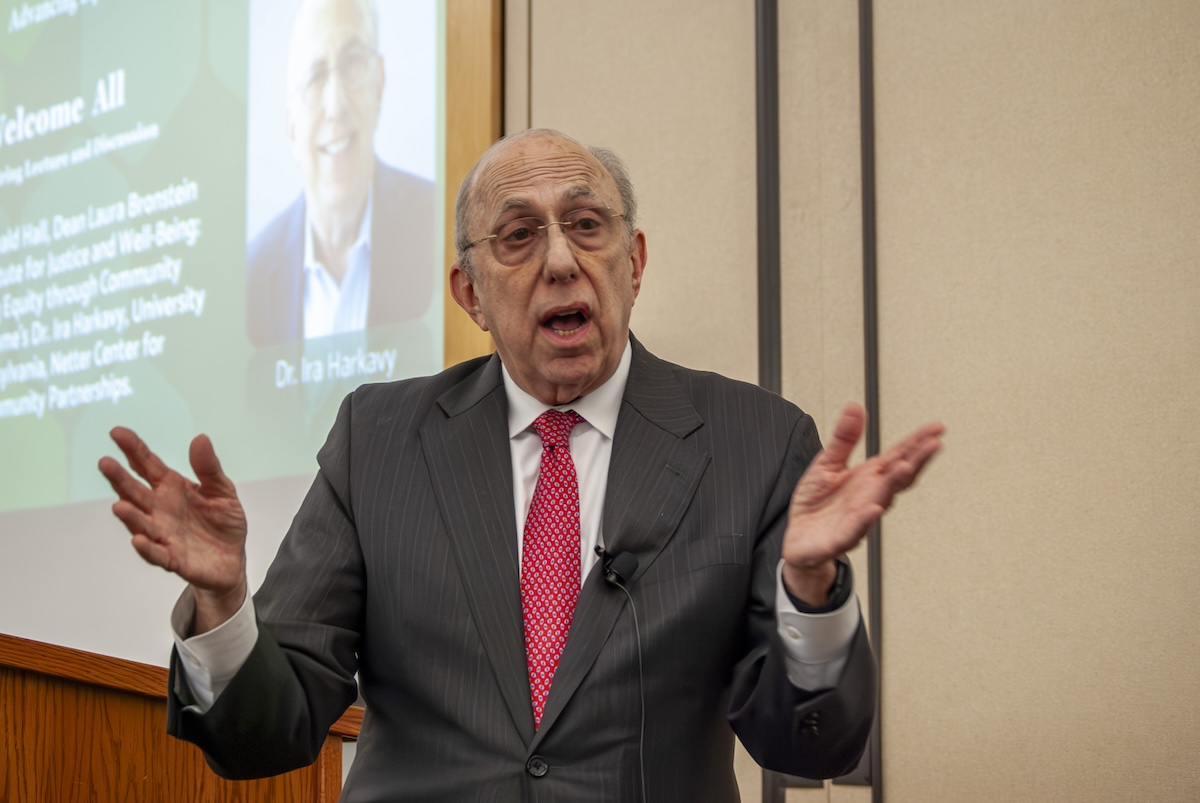Community Schools, education and the creation of democratic civic universities
Ira Harkavy, founding director of Netter Center, visits Binghamton to discuss the fight for a democratic society

When you think of the most organized societies, you probably imagine a set of laws, a formal gathering space or a system of trade. You are less likely to imagine a school — but to Ira Harkavy, they serve as the cornerstone to a democratic world.
“Education and society are dynamically interactive and interdependent,” said Harkavy, associate vice president and founding director of the Barbara and Edward Netter Center for Community Partnerships at the University of Pennsylvania. “If human beings hope to maintain and develop a particular type of society, at any degree, they must develop and maintain a particular type of education system conducive to producing that society.”
Binghamton University’s College of Community and Public Affairs — along with Dean Laura Bronstein and Provost Donald Hall — was proud to welcome Harkavy to Binghamton University for a lecture on “John Dewey, Community Schools, and Creating a Democratic Civic University” on Monday, March 11.
“Our BUCS program — the Binghamton University Community Schools project — has very much been indebted to and inspired by the Netter Center,” Provost Hall said. “We have an impact throughout our region of Broome County, and we support hundreds of students each year by volunteering and interning in the local community in partnership with our Center for Community Engagement. We have found the work of Ira and his colleagues truly inspirational as they have led us into this field.”
Harkavy is uniquely poised to speak as an expert on the topic: the Netter Center established the University-assisted community schools model that Binghamton University utilizes. Harkavy has been serving as the director of the Netter Center since 1992 and believes strongly in the democratic and civic missions of higher education. He serves as chair for several related coalitions and consortiums, has helped author thirteen books on the topic and serves as the executive editor of Universities and Community Schools.
Perhaps most significantly, he was fundamental in creating the community-engaged research projects and courses that have fostered the University of Pennsylvania’s connections in West Philadelphia. As a professor, he teaches in the Graduate School of Education, as well as in history, urban and Africana studies.
During his lecture, Harkavy argued that universities must, if they wish to succeed and create more just, anti-racist, democratic societies, move away from the narrow definition of an expert to a community of experts that includes place-based knowledge, and inspire active participation from community members to find solutions to local problems.
“Knowledge and learning are most effective when human beings work collaboratively to solve specific important real-world problems,” he said.
It is the university’s role, he said, to provide the resources —financial, academic or material — in a mutually beneficial relationship that improves learning and quality of life in PK-12 schools as well as the research, learning and service of the higher education institution.
Harkavy calls these new types of institutions “democratic civic universities.” And we have a long way to go before they can exist.
“For higher education institutions to make the contribution that they could and should, they must recognize that as they now function — particularly research universities — are today more part of the problem than they are part of the solution,” Harkavy said. “They also need to move beyond — indeed reject — the neoliberal model.”
Democracy is buffeted at all angles: by increasing inequalities, racism and xenophobia, as well as attacks on science and declining trust in institutions. Harkavy believes the failure of universities to implement ethical behavior in students and their focus on profit has not helped the situation.
“When institutions openly pursue commercialization, their behavior legitimizes and reinforces the pursuit of economic self-interest by students and amplifies the widespread sense that they are at college or university exclusively to gain career-related skills and credentials,” Harkavy said. “Student idealism and civic engagement are strongly diminished when students see that universities abandon academic values and scholarly pursuits to function as competitive profit-making corporations.”
His solution lies in the university-assisted community schools model. By having university members focus on place-based local partnerships, developing communities of experts and setting democratic implementation as the goal of research, Harkavy believes we can create better societies.
Since 2009, Binghamton University has been taking major strides towards these goals. For example, in 2014, CCPA partnered with the Center for Civic Engagement for the first time and helped place university interns and volunteers in local school districts to support students and the community school model.
In 2018, Binghamton University Community Schools was officially established and continued working towards the mission of placing schools at the centers of their communities; supporting the youth, families and neighborhoods that comprise them; and combating intergenerational poverty to increase youth and community success. In that same year, the New York State Department of Education designated Binghamton University as the Community School Technical Assistance Center (TAC) for Central and Western New York. Since then, Binghamton University has continued to make headlines.
Thanks to Ira Harkavy, the Netter Center and the hard work of dedicated CCPA faculty, staff and students, a “democratic civic university” is one step closer.
“The university-assisted community school idea logically extends and updates Dewey’s theory of the school and social sector. The neighborhood school becomes the core institution that provides comprehensive services, galvanizes other community institutions and helps solve the myriad problems that communities confront,” Harkavy said. “Dewey recognized that if the neighborhood school is to function as a genuine community center, it requires additional resources and support. That’s the work that BUCS does.”

